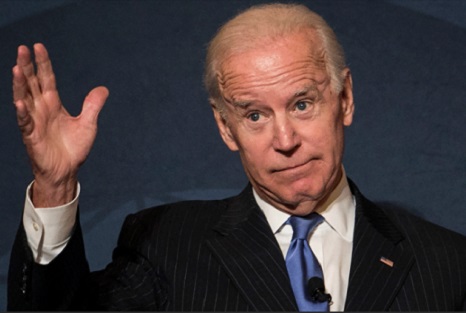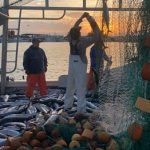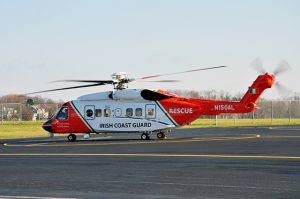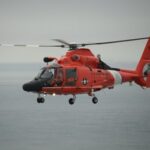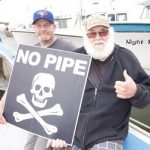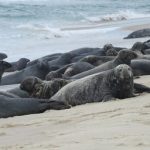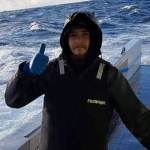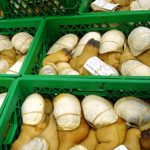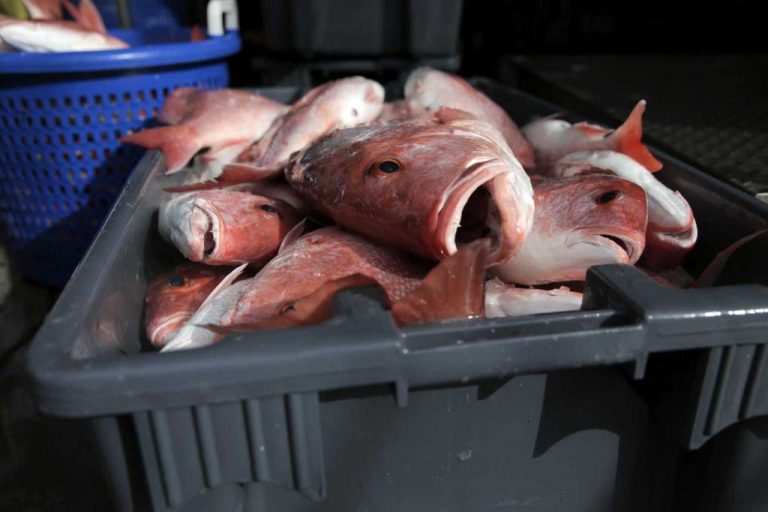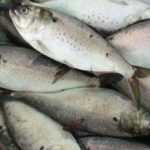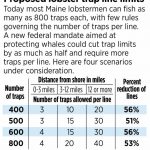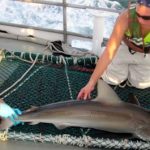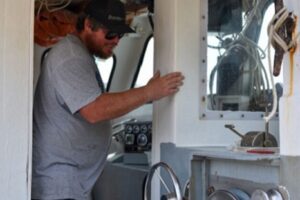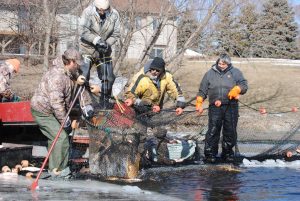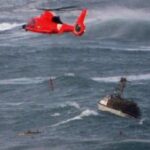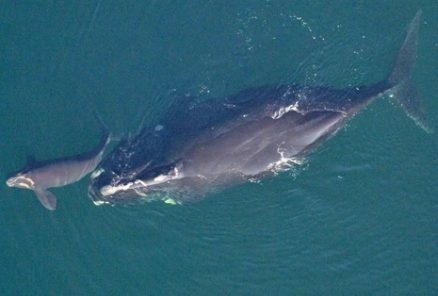Tag Archives: NOAA
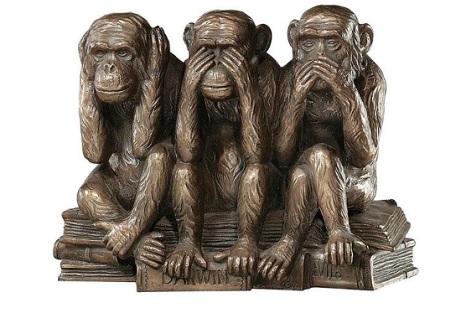
Are NOAA scientists being silenced? By Jim Lovgren
Since the beginning of December there have been at least twelve strandings of whales along the New York and New Jersey shores, all resulting in the death of these animals. An abnormal amount of strandings have been reported in a few southern states as well during this time frame, exacerbating
what NOAA has declared as an unusual mortality event taking place on the East coast that started in 2016. These deaths include, Humpback, Minke, Fin, Sperm, Northern Right Whale, various Dolphins and more since 2016. Many of the Mammals stranded are endangered species, with the Northern Right Whale considered critically endangered having a population of less then 350 animals remaining, which is down from close to 500 only a decade ago. A curious coincidence among these particular marine mammals is that they are classified as Low frequency cetaceans, meaning that they communicate, navigate and feed using low frequency sound. Similar to the frequency most commonly used for sonar mapping or submarine detection by the Navy. >click to read the article< 16:02
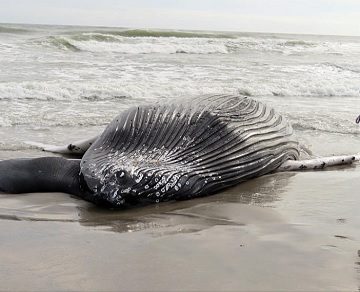
Pleas to pause wind farm plans over whale deaths have fallen on deaf ears: ‘Reeks of hypocrisy’
The mayor of Point Pleasant Beach, N.J., Paul Kanitra, has a theory on what may be behind the mysterious string of whale deaths that has left officials speechless. Since offshore wind energy development began in December, the region has witnessed 18 whale deaths – a severe uptick that is not a “coincidence,” the New Jersey mayor argues. “In a normal year, the Jersey Shore coast and in the tri-state area, we have one, two, maybe three whale deaths. Since they started doing this sonar testing, which started in December, we’ve had eight whale deaths off our coast, and that seems a lot more than a coincidence to us,” Kanitra said on “America’s Newsroom,” Friday. >click to read< 09:00
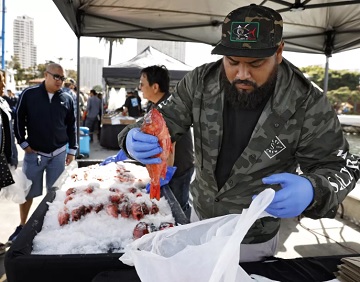
Biden needs to help California fishermen in our dispute over dangerous fish farms
When people think of California, they think of our coasts. Our vibrant ocean sustains a robust seafood industry, as well as many hospitality, tourism and recreation businesses. But in recent years, our coastal enterprises have faced a litany of challenges; pollution, climate change and development along the coast have made it difficult for independent businesses to survive. Now in 2023, another threat is looming: The National Oceans and Atmospheric Administration is scoping out Southern California as a new site for industrial-scale finfish farms. Last spring, NOAA identified 10 Aquaculture Opportunity Areas off the coast of Southern California. These areas are deemed ideal for offshore fish farms, despite the fact that two of them are in close proximity to a Superfund site where 500,000 barrels of the banned pesticide DDT were dumped. >click to read< 10:00
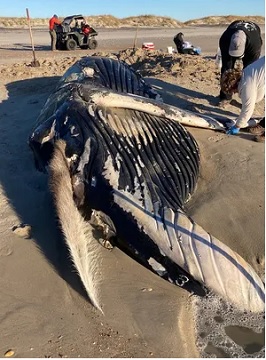
Whale deaths in NC and along the East Coast have officials searching for answers
On Jan. 7, a critically endangered North Atlantic right whale calf was found dead, wedged under a pier in Morehead City. In the previous month, three humpback whales washed up on beaches between Beaufort and the northern Outer Banks. The four North Carolina deaths are part of at least 14 whales that have washed up on East Coast beaches since Dec. 1. Federal officials, scientists and conservation groups have said there could be multiple factors contributing to the rise in whale strandings, including an increase in the population of the Western North Atlantic humpback whales. But one idea that’s gained traction online and among some coastal residents and politicians is that huge offshore wind farms planned off many East Coast states, including North Carolina, could be harming the marine mammals. >click to read< 08:46
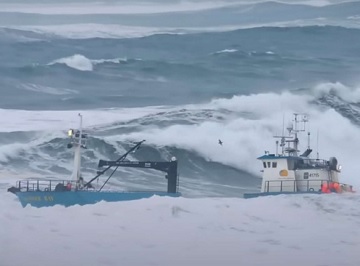
The Deadliest Catch and Other Crab Fishermen Need to Find a New Alaskan Spot Thanks to Climate Change
Even if you’ve only been a fan of Discovery’s “Deadliest Catch” for a short period of time, it’s still pretty obvious that the list of essential steps needed for the featured captains and boats to rake in a season’s worth of seafood remains consistent. On top of a meticulously maintained boat, needed are traps, bait, backup equipment, a solid crew, and more than a handful of other necessities. Of course, the most important detail is the one thing these brave fishermen are there for in the first place, and that’s the crab itself. However, due to climate change, the fishing industry on the Bering Sea has been flipped on its head. >click to read< 11:31
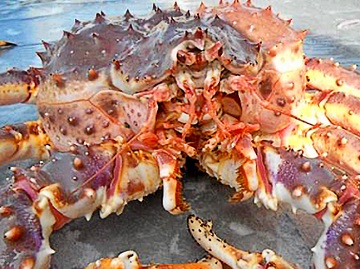
NOAA denies emergency request to close red king crab savings areas
The National Oceanic and Atmospheric Administration has denied an emergency request Friday to close crucial habitat for Bristol Bay red king crab to all types of commercial fishing. That comes after Alaska Bering Sea Crabbers petitioned in late September for a closure of the red king crab savings areas to protect the species during a time of historically low stocks. The savings area was established in 1996 and is permanently closed to bottom trawling, but it remains open to midwater trawlers, pot fishing and longlining. Bottom trawling is allowed, however, in a small section within the savings area, known as the savings subarea, when Bristol Bay red king crab is not open to directed fishing. >click to read< 09:15
Press release – NOAA Fisheries Denies Request for Emergency Action to Close the Red King Crab Savings Area and Subarea – >click to read<
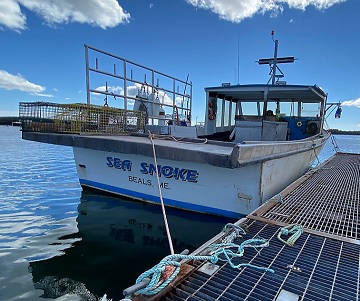
Maine lobster industry must accept that ‘big changes are coming’ despite delay in federal rules, commissioner says
“The work now is critical,” DMR Commissioner Patrick Keliher told the Lobster Advisory Council Wednesday. “The buy-in is critical. The data we’re going to be collecting over the next four years is critical. We can’t have infighting. We have to accept big changes are coming. ”Those changes could include additional regulations to make ropes weaker, a move toward ropeless lobster traps and additional restrictions on fishing grounds. Between now and then, the industry needs to report its harvest to federal officials, participate in a vessel tracking program and find ways to help monitor where endangered whales are migrating, Keliher said. >click to read< 08:49
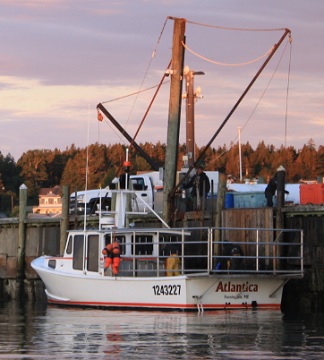
Maine wants to transform how the US manages the lobster fishery.
Patrick Keliher, Maine’s Department of Marine Resources commissioner, has argued that the fishery needs more “tools in the toolbox.” Now, with the most time he’s had in recent memory to sit down and craft new measures, he is hoping that the dawn of “dynamic management” in Maine is here. What is dynamic management? In theory, it’s a simple strategy to keep fishermen fishing, while also making way for whales. The Gulf of Maine would be monitored, with listening devices in the water and planes in the sky, for right whales. If signs of right whales are detected, fishermen would have to clear their traps out of the area. Dynamic management has been pitched by Maine before, and a version of it is being used in parts of the Canadian snow crab fishery. >click to read< 14:35
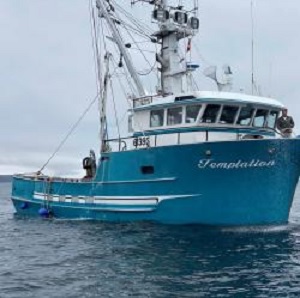
Electronic monitoring comes to Gulf of Alaska pollock fishery
Kiley Thompson knows the fishery well. He has been fishing in Alaska waters for nearly 30 years. After getting a job in college fishing for salmon, this eventually became his full-time profession. Today, he fishes along with three crew members in the Gulf of Alaska pollock fishery on F/V Decision, a 58-foot seiner/trawler based in Sand Point, Alaska. ‘The biggest challenge for us is getting observers, and you can end up losing fishing time waiting for them to arrive,’ Kiley Thompson said. In the face of these challenges, the Gulf of Alaska fleet turned to emerging electronic monitoring technologies. >click to read< 07:48

NJ governor: No pause in wind farm prep after 7th dead whale
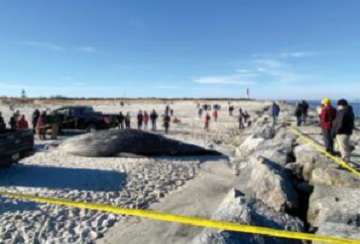
Advocacy Groups Demand Transparent Investigation into Deaths of Six Endangered Whales
Calling the deaths of six endangered whales that have washed up in 33 days on the beaches of New Jersey and New York “alarming and environmentally harmful,” local, state and regional ocean advocacy groups are calling for President Joe Biden to immediately address the unprecedented trend. “The noise from the offshore wind vessel is a potential cause of the recent whale stranding and increased near-shore sightings,” said Bob Stern, president of Save LBI, a nonprofit, non-partisan coalition opposed to the placement of offshore wind farms off Long Beach Island. “The beached whales bear no sign of vessel strike or fishing gear entanglement, leaving natural causes or noise as the potential causes and raising the likelihood that our concerns were well-founded.” >click to read< 16:03
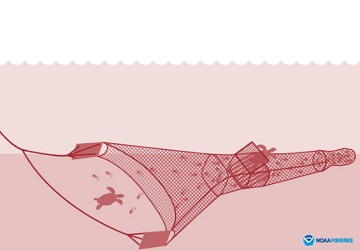
Mississippi Scientists Develop Unique Method Using Sound To Track Sea Turtle Data
Wayne Carpenter, senior research and development engineer, and Bradley Goodwiller, research scientist, are using sound to monitor turtles that exit shrimp trawls through turtle exclusion devices. “Acoustic impacts with TEDs have implications in understanding the population, migration and allocation of the species,” Carpenter said. “All of this contributes to important conservation work.” The project, Acoustic Enumeration of Sea Turtle Impacts with TEDs (Turtle Excluder Devices), was funded through the National Oceanic and Atmospheric Administration Bycatch Reduction Engineering Program. The federal government has mandated TEDs in the shrimping industry since 1987. They have been shown to be highly effective; however, obtaining information about sea turtle interactions with TED-equipped shrimp trawls has been challenging. >click to read< 14:25

South Jersey Times Editorial Board – N.J. whale death mystery may not lead to mighty wind
Depending on who’s counting, at least six whales have been discovered ashore since late fall. Let’s not to jump to conclusions, though, about why these whales died, at least not to the degree that we need to shut down everything that’s going on offshore. Pressure groups are already calling for moratoriums on any work related to offshore wind energy development, even though none of structures related to the turbines system exist off the Jersey coast. (The survey work is happening, though.) The developers of offshore wind, and cheerleaders who include our governor, are finding more pushback against these planned installations than they anticipated. It’s not just Clean Ocean Action that has a beef; commercial fishing groups and others concerned about shoreline aesthetics are weighing in, too. >click to read< 10:48
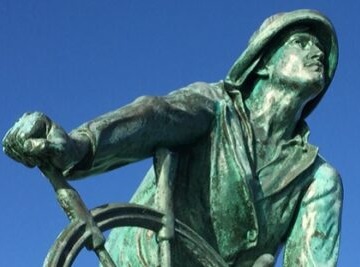
Cod: The New England Council has proposed a plan to restore cod by 2033
What that will mean is our fishing fleet would have to reduce their catch by whatever the council thinks will be helpful. Over the years NOAA has made reductions on cod and other species, based on their studies and science. Under law, they do not have to compare their findings. We need to update the Magnuson–Stevens Act that would require them to compare data before making restrictions on species of fish. Put this aside, if we want to bring back the cod, no fishing vessel can land cod over the next ten years. Great! So be it. Pay our fisherman to not catch cod. Farmers have a Farm Bill and pay farmers not to grow certain crops. So why can’t our government create a Fish Bill to do the same for the U.S. fishing industry? This could be paid for by increasing the duty on imported fish. This is a Win-Win solution. Sam Parisi, Gloucester, Mass. 19:27
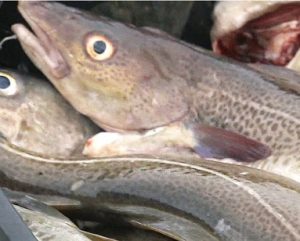
Fishing plan can rebuild long lost cod stock by 2033
Most of the cod now sold in the U.S. comes from overseas because many American fishermen avoid the fish-and-chips staple altogether. But the regulatory New England Fishery Management Council has approved a new strategy that it said has a 70% chance of rebuilding the stock by 2033. The proposal, which is awaiting final approval from NOAA, would use 10 years of low catch limits to try to rebuild the cod population in the Gulf of Maine. But some fishermen are unconvinced cod are ever coming back. Fishermen have grown used to choking quotas on cod catch and have moved on to other species, said Terry Alexander, a longtime fisherman from Harpswell, Maine, who targets haddock and monkfish these days. “I would like to have my codfish back, for sure. We could make some money on them. But that’s never going to happen,” >click to read< 16:02
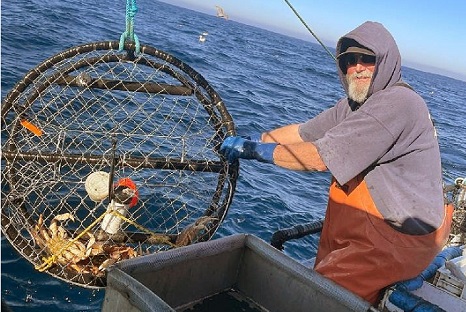
Regulated revenue: New rules, delayed season cut into local crabbers earning potential
Local crabbers and fishermen struggle to make ends meet due to stormy weather, a delayed fishing season, and a new state mandate. On Dec. 26, the California Department of Fish and Wildlife (CDFW) announced that fisheries stretching roughly from Bodega Bay to Point Conception would finally open on Dec. 31, but now under one condition, crabbers and fishers are required to limit the use of crab traps and gear they throw in the water by 50 percent. Longtime Morro Bay crabber Jeff French said the new rules set by the Department of Fish and Wildlife put crabbers and fishers at a disadvantage. “Our costs are going to be basically the same, except that now we’re expected to make a living on half of our normal gear allotment and we have to pay for tags or licenses every other year for our traps,” >click to read< 12:12

Offshore wind farms threaten New Jersey’s shellfish industry. Should fishing communities be compensated?
Earlier this month, New Jersey announced it would join eight other states that are seeking a regional approach to compensate fishing communities for the impending losses. “Are we going to be allowed to fish inside of them (the wind turbine fields)?” asked Kirk O. Larson, a scallop fleet owner and mayor of Barnegat Light, New Jersey. “Why did (the federal Bureau of Ocean Energy Management) put a wind farm right inside of a scallop area, the most productive scallop area pretty much on the East Coast, not counting Georges Bank.” Shellfish harvesters like Larson are expected face serious financial damage from offshore wind development projects. “I’m not looking for compensation,” said the scallop fleet owner. “I’m looking for work, so I’m not really looking for welfare.” >click to read< 07:43
Markey, Moulton push for national fund to compensate fishermen for losses due to offshore wind >click to read<
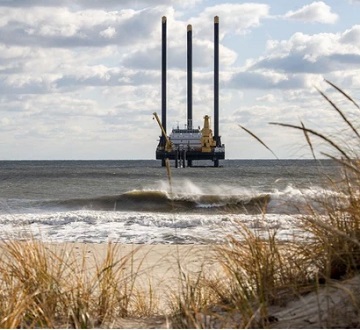
Follow the Science? US Ignored Own Scientists’ Warning in Backing Atlantic Wind Farm
US government scientists warned federal regulators the South Fork offshore wind farm near the Rhode Island coast threatened the Southern New England Cod, a species so venerated in the region a wooden carving of it hangs in the Massachusetts state house. The warnings were delivered in unpublished correspondence weeks before Interior’s Bureau of Ocean Energy Management authorized the 12-turbine South Fork plan in November 2021. And they serve to underscore the potential ecological consequences and environmental tradeoff of a coming offshore wind boom along the US East Coast. President Joe Biden wants the US to deploy 30 gigawatts of offshore wind by the end of the decade. >click to read< 10:15
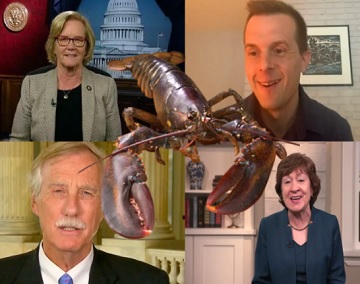
Maine Pols Brag About Stopping Unscientific Lobster Regs in Monsterous $1.7T Omnibus Bill
Maine’s Congressional Delegation and Gov. Janet Mills gave themselves a hearty pat on the back Tuesday for convincing Members of Congress to temporarily halt an unscientific regulatory crusade on the Maine lobstering industry. Maine’s Congressional Delegation has in recent years also voted to massively increase NOAA’s funding, meaning Maine lawmakers helped fund the very crusade they’re now bragging about halting, temporarily. All told, NOAA’s funding has increased by more than $6 billion since President Joe Biden took office, all with the support of Maine’s elected officials. >click to read< 11:09

In Hot Water
So, let’s run a logical thought based on what our governments assumption is on fish stocks with what we know. NOAA says there is nothing wrong with the biomass of white hake, but they cannot find adolescent hake. Ask a lobsterman along the shoreline. They are seeing an abundance of juvenile hake and cod in their traps. Imagine lobstermen and inshore fishermen across a vast area all saying the same thing? NOAA says there’s nothing wrong with the biomass of haddock but same thing, they can’t find small fish. But what do we know?! >click to continue reading< By Jerry Leeman 20:30
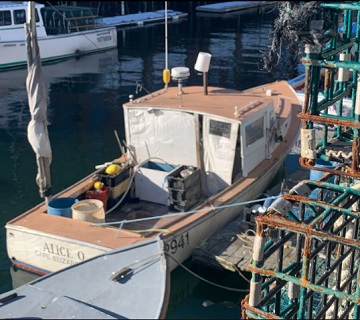
Zero means zero. ‘We’ve been innocent:’ Federal spending bill could provide lifeline for Maine lobstermen
Tuesday, Maine’s congressional delegation moved to block plans for even stricter federal regulations on Maine lobstermen designed to protect the right whale. If approved, the measure would give the U.S. lobster fishery six years before any further action is taken to prevent fishing gear from entangling whales. Lobstermen say there’s no need for new regulations on them, claiming there’s no evidence whales are getting snared in their gear, but environmentalists say this puts right whales on a path to extinction. “Zero means zero. I mean, we’ve had zero entanglements in the last 20 years,” Knight said. “There’s never been a death attributed to Maine lobster gear. We’ve been innocent right along.” Video, photos, >click to read< 09:20

Wind industry group says turbine restrictions for whales could threaten commercial viability of projects
An organization that represents and lobbies for the wind industry has warned that a recommendation from federal scientists to limit turbines in offshore lease areas to protect the endangered North Atlantic right whale could threaten the commercial viability, efficiency and utilities contracts for some projects. In a letter first published by The Light last month, NOAA scientist Sean Hayes proposed establishing a “conservation buffer” zone or turbine-free area overlapping with wind development planned in Southern New England. But the American Clean Power Association (ACP), which represents the wind industry, said such a buffer would cause the removal of a “significant number” of turbines from several projects. >click to read< 07:29
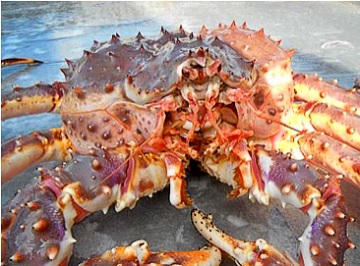
Alaska crab fishery collapse seen as warning about Bering Sea transformation
Less than five years ago, prospects appeared bright for Bering Sea crab fishers. Stocks were abundant and healthy, federal biologists said, and prices were near all-time highs. Now two dominant crab harvests have been canceled for lack of fish. For the first time, the Alaska Department of Fish and Game in October canceled the 2022-2023 harvest of Bering Sea snow crab, and it also announced the second consecutive year of closure for another important harvest, that of Bristol Bay red king crab. What has happened between then and now? A sustained marine heat wave that prevented ice formation in the Bering Sea for two winters, thus vastly altering ocean conditions and fish health. “We lost billions of snow crab in a matter of months,”,,, >click to read< 18:54
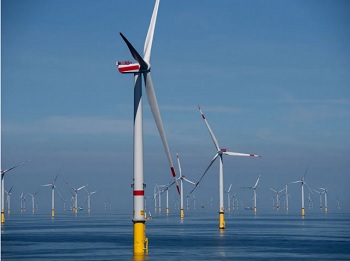
Offshore Wind Farms in New England Create Headaches for Both Man and Beast
“I don’t think ever in history has there been such a massive alteration of the ecosystem in such a short amount of time,” says the executive director of New Jersey-based Clean Ocean Action, Cindy Zipf. “We’re looking at 3,500 turbines as tall as the Chrysler Building, 2.2 million acres of ocean, and 10,000 miles of cable just in the Northeast in just the next seven years.” At the center of the conflict is the North Atlantic right whale and other endangered marine mammals that the Commerce Department’s National Oceanic and Atmospheric Association National Marine Fisheries Service are charged with protecting. Fewer than 350 right whales are left in the Atlantic Ocean, according to the fisheries service. >click to read< 08:14
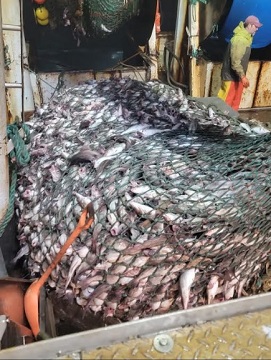
Jerry Leeman: So, let’s plug in what we know.
So, let’s run a logical thought, based on what our governments assumption on fish stocks is, with what we know. NOAA says there is nothing wrong with the biomass of white hake, but they cannot find adolescent hake. Well ask any lobstermen along the shorelines, they are seeing abundance of juvenile hake and cod in their traps. Imagine Lobstermen and inshore fishermen across a vast area all saying the same thing? NOAA says there’s nothing wrong with the biomass of haddock but same thing, they can’t find small fish. Well, what do we know?!! >click to continue reading< 08:33
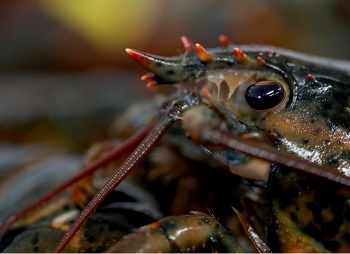
Lobster more than a Maine event
The headline said that Whole Foods would no longer be selling Maine lobster in its stores. My first reaction was to wonder what the lowly, although expensive crustacean had done to warrant such action from Whole Foods usually described as an upscale grocery chain that is owned by Amazon and as such is a part of the Jeff Bezos’ empire. To add insult to injury the California based Monterey Bay Aquarium through its environment focused seafood watch went and “red listed” Maine lobsters. I guess that means shipments of Maine lobsters will be stopped at the California border. I wonder if that includes the border with Mexico where just about anything gets through? Obviously, the Maine lobstering industry is up in arms over all this. >click to read< By Thomas Kirkpatrick Sr 12:56
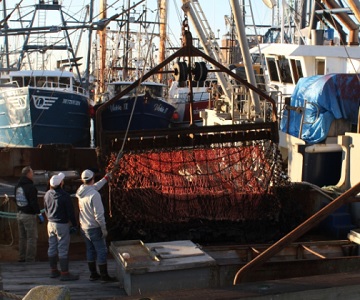
Regulators see hard years ahead for the scallop fishery, New Bedford’s cash cow
Scientists report that young scallops off the eastern seaboard have been struggling to grow to maturity for nearly a decade now, constraining one of the nation’s most lucrative fisheries to its lowest biomass in more than 20 years. In a presentation before the New England Fishery Management Council on Wednesday, the council’s scallop analyst Jonathon Peros projected that the latest regulations adopted by the council will cap next year’s scallop harvest at 25 million pounds, a steep drop from a record harvest of 61 million pounds recorded just four years earlier. >click to read< 09:45
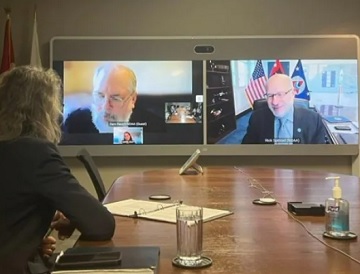
Fisheries minister pushes for joint Canada-U.S. management of depleted Atlantic mackerel stock
“We don’t support the fact that we had closures because the stock was in critical condition and the United States were fishing essentially that same stock,” Canada’s Fisheries and Oceans Minister Joyce Murray told a parliamentary committee Friday. Murray’s remarks are a more public stance on what has been a quiet effort by Canada to persuade the United States to jointly manage a species both countries say is in trouble. Murray said she expressed her concerns in a virtual meeting earlier on Dec. 2 with her U.S. counterpart, Richard Spinrad, who leads the National Oceanic and Atmospheric Administration or NOAA. “He wants to invoke the precautionary principle, which in my view, wasn’t happening adequately. We agreed that we share our approach to this and in two months there will be meetings between NOAA and DFO to discuss our assessments and build a better approach to rebuilding mackerel.” >click to read< 10:03






